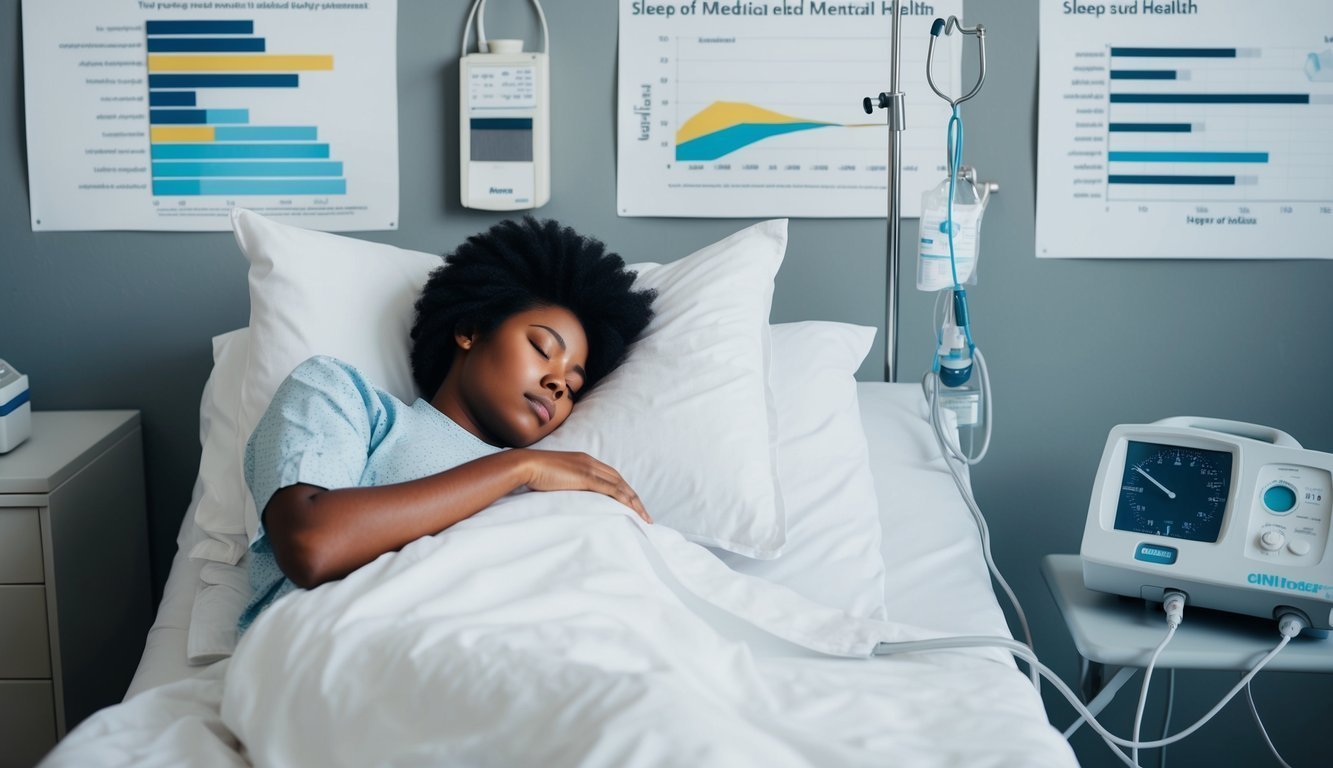PsychNewsDaily Publishers
100 Summit Drive
Burlington, MA, 01803
Telephone: (320) 349-2484
PsychNewsDaily Publishers
100 Summit Drive
Burlington, MA, 01803
Telephone: (320) 349-2484
Sleep significantly influences mental health, with inadequate sleep contributing to mood disorders, anxiety, and cognitive impairment, while mental health issues can disrupt sleep patterns.

The connection between sleep and mental health is profound, as each substantially affects the other. Both the quality and length of sleep are pivotal for sustaining emotional well-being, while mental health issues can significantly disrupt sleep patterns.
Sleep is vital for optimal brain function and emotional balance. While we sleep, our minds process experiences, solidify memories, and manage our emotions. Sufficient sleep is essential for cognitive abilities, mood stability, and general mental health.
Studies indicate that lack of sleep can result in heightened irritability, mood fluctuations, and trouble focusing. In contrast, practicing good sleep hygiene can bolster emotional resilience and cognitive performance.
The neurotransmitter systems in the brain, which oversee mood and behavior, are significantly affected by sleep. Interruptions in sleep can disrupt these systems, potentially leading to the emergence or worsening of mental health disorders.
Sleep disorders frequently coincide with psychiatric conditions, creating a complex relationship between them. Conditions like insomnia, sleep apnea, and narcolepsy can greatly influence mental health.
Research indicates that people suffering from sleep disorders face an increased risk of developing psychiatric issues like depression, anxiety, and bipolar disorder. For instance, those with chronic insomnia tend to show more symptoms of depression.
Similarly, many psychiatric conditions can disrupt sleep. Disorders such as depression, anxiety, and PTSD often present sleep abnormalities as a primary symptom, complicating treatment and recovery.
Inadequate or low-quality sleep can heighten levels of stress and anxiety. A lack of sleep leads to an overactive amygdala, which is responsible for emotion processing. This heightened state can result in increased emotional reactivity and anxiety.
Prolonged sleep deprivation can also raise cortisol levels, the primary stress hormone in the body. Increased cortisol can lead to:
This creates a cycle where stress and anxiety disrupt sleep, while poor sleep exacerbates stress and anxiety.
Depression and sleep disturbances often engage in a bidirectional relationship, with each aggravating the other. Research suggests that people with depression often face sleep difficulties, experiencing either insomnia or hypersomnia.
Sleep issues linked to depression can include:
These sleep-related challenges can intensify depressive symptoms, creating a tough cycle. Addressing sleep issues is often essential in treating depression, as enhanced sleep can improve mood regulation and overall mental health.
Cognitive-behavioral therapy for insomnia (CBT-I) has shown effectiveness in simultaneously addressing sleep disturbances and depressive symptoms, underscoring the interconnectedness of sleep and mental health.

Sleeping patterns and requirements evolve throughout one’s life, significantly impacting mental health across different developmental stages. The dynamic between sleep and psychological well-being varies notably from childhood to old age.
Children and adolescents need more sleep than adults for proper development and cognitive capabilities. Inadequate sleep in the younger population can result in attention deficits, hyperactivity, and learning challenges.
Evidence reveals that sleep deprivation among children may lead to symptoms similar to ADHD. Poor sleep quality is also linked to a heightened risk of behavioral problems and mood disorders in teenagers.
For children with neurodevelopmental disorders like autism spectrum disorder, sleep difficulties are especially common and can worsen symptoms. Early intervention to address sleep issues can enhance overall functioning and mental health outcomes.
Genetics may influence sleep patterns and vulnerability to sleep disorders, affecting mental health from a young age.
Insomnia is a prevalent sleep disorder in adults that carries significant mental health consequences. Research suggests that poor sleep quality correlates with various mental health issues in non-clinical adult populations.
Chronic insomnia has been associated with:
Adults with mental health conditions frequently encounter sleep disturbances, establishing a bidirectional relationship between sleep and psychological health.
Polysomnography research has identified specific alterations in sleep architecture related to various mental disorders in adults, emphasizing the intricate ties between sleep physiology and mental health.
As people age, their sleep patterns naturally transform. Many older adults experience:
These age-related sleep alterations can influence mental health. Poor sleep quality in seniors correlates with a higher risk of depression, anxiety, and cognitive decline.
Insomnia among older adults may worsen existing health conditions and lower quality of life. Addressing sleep concerns in this demographic is vital for preserving mental well-being and cognitive capabilities.
Certain sleep disorders, such as sleep apnea, become more prevalent as people age and can significantly impact mental health if not treated.

Everyday habits and choices considerably influence both sleep quality and mental health. Variables such as diet, physical activity, substance usage, and environmental conditions all play key roles in shaping sleep patterns and psychological health.
A nutritious diet bolsters healthy sleep cycles and cognitive functioning. Foods high in tryptophan, magnesium, and melatonin can enhance sleep quality. Examples include:
Regular physical activity improves sleep quality and duration. Engaging in moderate aerobic exercise for 30 minutes daily can enhance deep sleep phases. However, intense workouts close to bedtime may disrupt sleep.
Exercise also elevates mood and mitigates symptoms of anxiety and depression by increasing the production of endorphins and promoting neuroplasticity, thus aiding emotional regulation and stress management.
Alcohol may initially induce sleepiness, but it disrupts sleep architecture, resulting in fragmented and low-quality rest. Habitual consumption can worsen sleep disorders and mental health issues.
Caffeine, a stimulant, can hinder sleep onset when ingested late in the day. Its effects can persist for up to six hours, potentially resulting in insomnia or diminishing sleep quality.
Some medications can alter sleep patterns. For instance, certain antidepressants may change REM sleep, while beta-blockers can inhibit melatonin production. It’s crucial to discuss potential sleep-related side effects of prescribed medications with healthcare providers.
A supportive sleep environment is crucial for optimal sleep hygiene. Vital aspects include:
Maintaining consistent sleep habits supports mental wellness. Establishing a regular sleep routine, even on weekends, helps regulate the body’s internal clock. Calming bedtime routines, such as reading or drinking chamomile tea, can signal the body to prepare for sleep.
Electronic devices emit blue light, which can suppress melatonin production. Reducing screen time before bed and utilizing blue light filters can improve sleep onset and quality.

The quality and duration of sleep greatly affect both physical and mental health outcomes. The complex relationships between medical conditions, sleep patterns, and psychological well-being highlight the significance of addressing sleep issues in healthcare.
Chronic health conditions often relate to sleep disturbances, creating intricate interactions between physical and mental health. For example, those with diabetes might experience nighttime fluctuations in blood sugar levels, resulting in disrupted sleep.
Obesity is another condition closely linked to sleep quality. Poor sleep can lead to weight gain, while excess weight increases the risk of sleep apnea. This interplay can adversely affect mental health, leading to conditions like depression or anxiety.
Individuals with heart disease frequently report poor sleep quality, which may intensify symptoms and escalate stress levels. Improving sleep can support recovery and enhance overall well-being.
Sleep disturbances are prevalent in various psychiatric disorders and can greatly affect their severity. Bipolar disorder, for example, features alternating episodes of mania and depression, both of which can be triggered or worsened by erratic sleep patterns.
In cases of schizophrenia, sleep abnormalities are common and may contribute to the severity of symptoms. Addressing sleep problems within treatment plans for schizophrenia may improve overall functioning and quality of life.
Those suffering from post-traumatic stress disorder (PTSD) may frequently experience nightmares and insomnia, which can exacerbate symptoms and hinder recovery. Cognitive-behavioral therapy for insomnia has shown promise in alleviating both sleep and PTSD-related symptoms.
Depression and anxiety disorders often coexist with sleep problems. Treating sleep disturbances can lead to improvements in mood and anxiety levels, highlighting the necessity of addressing sleep in mental health treatment.

Sleep is vital for mental health, impacting brain function, emotional regulation, and overall wellness. The duration, quality, and timing of sleep considerably influence psychological health outcomes.
Research indicates that both too little and too much sleep can adversely affect mental health. The National Sleep Foundation recommends that adults aim for 7-9 hours of sleep. Chronic sleep deprivation is linked to an elevated risk of depression, anxiety, and mood disorders.
A meta-analysis encompassing 72 studies revealed that individuals with short sleep duration face a 48% higher risk of developing depression. Conversely, hypersomnia (excessive sleep) correlates with a 38% higher risk of depression.
Sleep duration also influences cognitive capabilities. Studies reveal that insufficient sleep impairs attention, memory, and decision-making abilities. These cognitive deficits can exacerbate existing mental health issues or contribute to the emergence of new ones.
Disturbed sleep can significantly impact brain function and mental health. Disrupted sleep patterns are commonly observed in various psychiatric disorders, including post-traumatic stress disorder (PTSD) and bipolar disorder.
Nightmares, a common symptom in PTSD, can lead to disrupted sleep and increased emotional reactions. This pattern of disturbed sleep may intensify PTSD symptoms, creating a difficult cycle.
Brain imaging studies suggest that sleep deprivation alters activity in key emotional regulation areas, such as the amygdala and prefrontal cortex. Such changes can result in:
Shift work, which disrupts natural sleep-wake rhythms, has been associated with increased rates of depression and anxiety among employees.
Chronobiology examines biological rhythms and emphasizes the significance of sleep timing concerning mental health. The circadian rhythm, our internal 24-hour clock, governs sleep-wake cycles and influences various physiological processes.
Disruptions to the circadian rhythm can have deep implications for mental health:
Research reveals that aligning sleep habits with the natural light-dark cycle can enhance mood and cognitive functioning. Light therapy has been effective in resetting the circadian rhythm and treating specific mood disorders.
Healthcare providers are increasingly acknowledging the significance of addressing sleep issues as part of mental health treatment. Strategies aimed at improving sleep quality and aligning circadian rhythms are becoming essential components of comprehensive mental health care plans.
“`